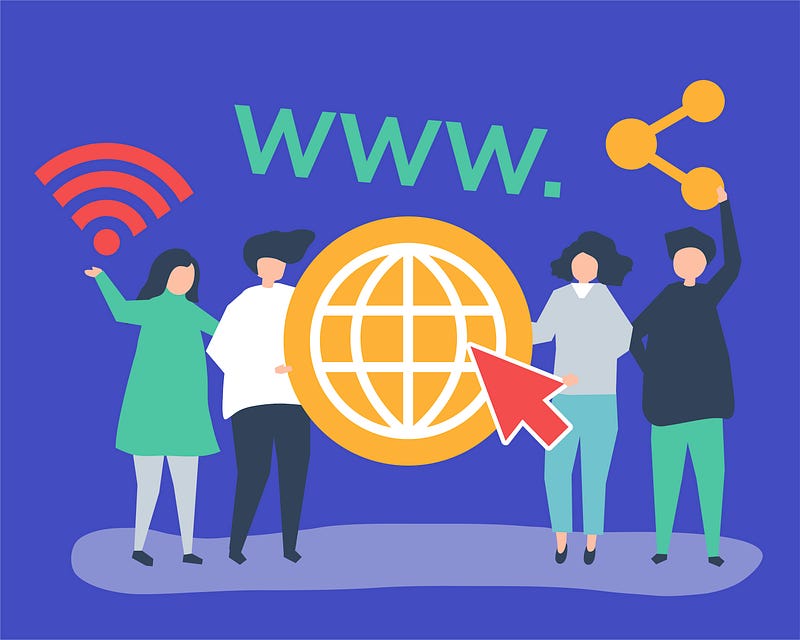Empowering Users: Reclaiming Control Over the Web Experience
Written on
Chapter 1: The Current State of the Web
In our perception of technological advancement, we often envision progress—tools and platforms becoming increasingly beneficial, sophisticated, and enjoyable to use. The evolution of the telephone from basic models to smartphones and the advancement of vehicles towards autonomy are prime examples.
However, the state of the World Wide Web, arguably our most crucial communication tool, appears to be regressing. The quality of our online experiences has significantly declined, with terms like "open" and "empowering" losing their relevance. Instead, we are confronted with descriptors such as "divisive," "unsecure," and "misleading."
The issues plaguing the web gained widespread attention, particularly following the Facebook-Cambridge Analytica incident in 2018. Society has become more skilled at pinpointing problems like biased algorithms and misinformation. Yet, solutions remain elusive, and those proposed often fall short. Some advocate for self-regulation by Silicon Valley giants, while others suggest complex regulations that are difficult to agree upon, implement, and enforce.
There are glimmers of hope, such as the EU's General Data Protection Regulation (GDPR), which aims to safeguard user data. High-profile figures like Twitter's Jack Dorsey have expressed remorse before government bodies and committed to improvement. Nevertheless, while some regulations may show partial effectiveness in Europe, they often struggle to find a foothold in the U.S. or China—home to many major tech firms. Unfortunately, despite assurances, issues like disinformation and harassment continue to flourish on platforms like Twitter, Facebook, and YouTube.
This paragraph will result in an indented block of text, typically used for quoting other text.
Section 1.1: A New Perspective on User Empowerment
However, an alternative approach exists—one that doesn’t depend on companies reluctantly prioritizing user interests over profit or on the uncertain effectiveness of regulations. We can leverage existing technologies along with proven business models to rectify the flawed user-platform relationship.
At present, data-harvesting platforms such as Facebook and Google hold immense power online. With their sophisticated tracking methods, opaque privacy policies, and advanced AI technology, these companies possess far more knowledge about users than users have about them. This dynamic leads users to surrender sensitive personal information in exchange for various services. For instance, we willingly provide our entire social circles to utilize Facebook, or trade our shopping behaviors for Amazon's convenience.
Moreover, the centralized nature of these platforms limits accountability, leaving users with few alternatives. In fact, just three corporations—Facebook, Google, and Tencent—dominate the social media sphere. As a consequence, even after Facebook's scandals in 2018, users had nowhere viable to turn.
But imagine if users possessed the same level of power as these platforms. What if users had a dedicated layer of support—an array of advanced tools to fend off intrusive advertisements, protect personal data, and negotiate assertively with platforms?
Subsection 1.1.1: A User-Centric Web
In this envisioned, more user-centric web, individuals would regain control over their digital experiences. For example, users could manage their personal information (like browsing habits and purchase history) in a secure, localized repository. They could then choose to share or withhold specific data in exchange for services from internet companies. Furthermore, users might deploy a personal AI avatar to act as a digital representative, negotiating with the platforms’ algorithms designed to keep them engaged with endless content. This digital proxy would be akin to Jarvis from the Iron Man franchise, contrasting with the passive data collection of devices like Alexa.

Section 1.2: Bridging the Gap
The technologies needed for this transformation are already in existence, yet they are not tailored to prioritize user needs. While standalone tools such as ad blockers, VPNs, and AI APIs are accessible, they often demand considerable time and technical expertise to implement and manage. Moreover, these tools typically function in isolation rather than as part of a cohesive user-centered industry. Thus, how can we cultivate a user-centric industry? Who will offer the data repositories, AI assistants, and modular hardware necessary for this shift?
Chapter 2: The Role of Trusted Intermediaries
We don’t need an entirely new business model to achieve this. Instead, a return to established concepts, such as the trusted intermediary, provides a viable solution. The idea of a reliable fiduciary is deeply rooted in society—from doctors to lawyers to financial advisors—and predates the internet by decades. Various entities, including ISPs, retailers, libraries, unions, and nonprofits, could step in to deliver these new web services. Furthermore, traditional news organizations, facing challenges in the digital age, could reclaim relevance and revenue as trusted intermediaries.
The first video, "Fix Other User Login Screen - YouTube," discusses troubleshooting techniques for addressing login issues across various platforms.
The second video, "How to fix 'This sign-in option is disabled' on Windows 11/10 - YouTube," offers step-by-step guidance on resolving sign-in problems in Windows.
With insights drawn from platform economics, complexity science, and game theory, these intermediaries can develop customer-focused business models that provide lasting value. The beauty of this approach lies in fostering a voluntary, trust-based relationship between users and intermediaries, where users are the primary focus rather than mere data points.
The current decline of the online experience does not have to be a cause for alarm, nor does it necessitate an elusive regulatory solution. By transferring certain empowering technologies from platforms to users, we can cultivate a web where individuals regain their agency. Additionally, by nurturing a new industry of intermediaries that genuinely support everyday users, we can establish a vibrant ecosystem where choice, privacy, and control are the norm—not fading memories of a bygone era.
Richard Whitt serves as the head of the GLIA Foundation, which is dedicated to creating a web ecosystem that restores balance to the user-platform dynamic.